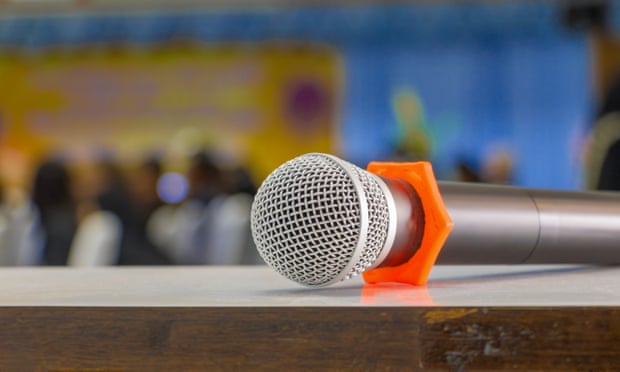Clinic hopes to help those at risk of losing ability to speak maintain sense of identity
Source: The Guardian
A pioneering centre aimed at preserving and re-creating people’s voices using artificial intelligence has opened in the US, with researchers hoping it will change the lives of people who face losing their ability to speak.
Researchers say the venture – a joint effort between Northeastern University in Boston and the company VocaliD – could play an important role in maintaining a sense of identity among those with conditions ranging from throat cancer to motor neurone disease, by offering them the chance to sound like themselves even after self-generated speech has become impossible.
Thought to be the first of its kind, the centre’s lead researcher is Prof Rupal Patel, the founder and chief executive of VocaliD.
While Patel said the company already offered individuals the option to record their voices in their own homes, in reality, many people either lack equipment for high-quality recordings or make recordings with background noise. Patel said there was also a need to offer greater support to those who require such services and make sure patients were aware they were available in plenty of time.
“Oftentimes, they’ll come to us at the last minute,” she said. “They don’t have enough time to bank their voice and they are also just so enveloped in their disease and then the surgery – that is very stressful.”
As a result, the company has teamed up with Northeastern – where Patel is currently on leave as a faculty member – to bring the technology to the community. The upshot is the Voice Preservation Clinic, a centre where people, typically those at risk of losing their voices, can record themselves as part of a “legacy” project.
The approach is far more sophisticated than chopping up words and then stringing them together, instead making use of machine-learning algorithms – a type of artificial intelligence. The first step is to “bank” the voice, with participants offered poems, short stories or speeches from a range of topics, which they record in a special booth.
“What we have them do is record about two to three hours of speech. From those recordings, we then are able to build an AI-generated voice engine, essentially, that sounds like them,” said Patel. Effectively, it can say words, in the user’s voice, that were never recorded.
When the digital voice is installed on the accompanying app, whether on a phone or special device, a user can type what they want to say and the audio will produce the sentences in the user’s voice.
“With the cancer population, they have control of their hands, and they can communicate – but they want to communicate as themselves,” Patel said.
The legacy project, she added, is different to the company’s other service, in which people can donate recordings of themselves speaking to help build a “bespoke” voice for those who are already unable to speak.
The technology, said Patel, is improving rapidly – voices are sounding more and more like human speech and, while there is still some way to go on changing the intonation of the voice, the team has started developing filters to offer users more choice when it comes to how phrases are expressed.
Patel said the team could also age an individual’s voice so it grows with them, but only up to a point. It is not yet possible to turn a child’s voice into that of a teenager or an adult, although the team can turn it into the voice of an older child.
While the recording service is free, it will cost $1,499 (£1,360) to have a voice built. However, the clinic said it would not charge customers during its first year.
Patel said anyone can come and bank their voice, but priority will be given to those who are expecting to lose their ability to speak.
Source: The Guardian

































Leave a Comment
You must be logged in to post a comment.